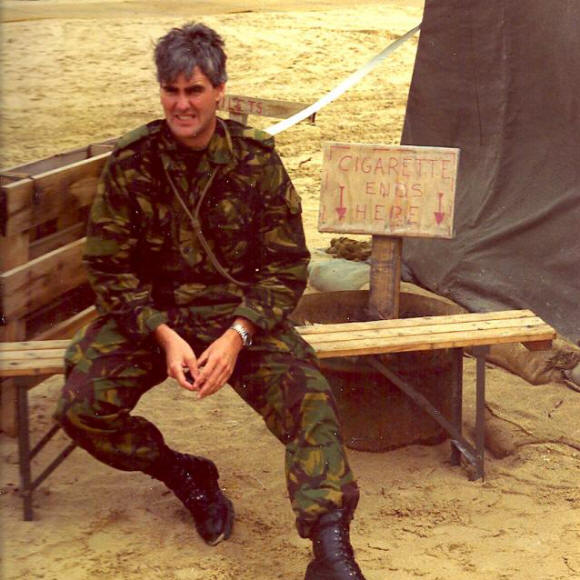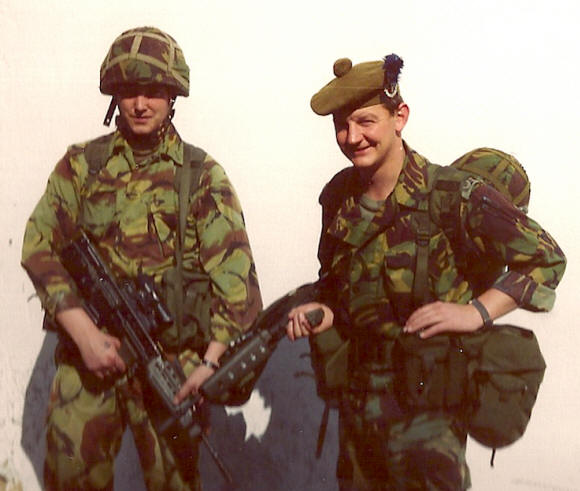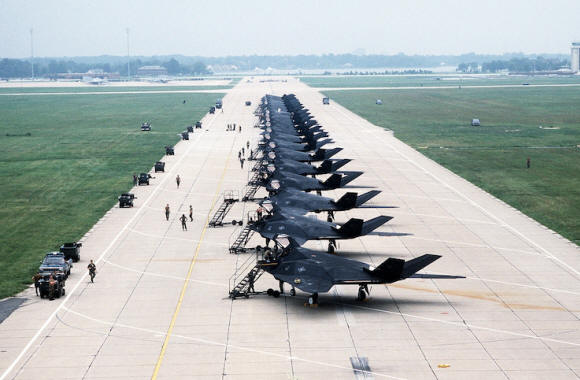|

AND SO
1991 ARRIVED and found all of us at Headquarters British
Forces Middle East (HQBFME) in reasonably good spirits.
By now we realised that the chances of resolving the
crisis in the Gulf without going to war were slipping
away. With nearly 430,000 US troops in Kuwait Theatre of
Operations (KTO) and Saddam Hussein threatening to
attack Israel, it seemed that there was little room for
diplomatic manoeuvre left.
Actually the New Year was nearly a very short one for me
(pictured above at al Jubail airstrip). Travelling down
the motorway to visit Div HQ in the desert we had a blow
out in our car at 100 mph. It was exciting at the time
but the driver managed to keep control, aided by the
fact there was no other traffic on the road. Got the
heartbeat up a bit but otherwise we were OK.
The desert was… pink! Did you know that? I always
thought it was a sandy colour but the bit I saw was
definitely pink. Which might explain why the SAS, who
are well hard and not generally associated with girly
colours, tend to paint their vehicles accordingly when
involved in desert ops. Who knew? I didn’t, but now I’ve
seen it with mine own eyes I understand.
But I digress. The desert was absolutely covered with
military kit. As far as the eye could see there were
vehicles static and moving, tented camps, supply dumps
and all the other paraphernalia that signifies a major
military operation. It took some time to locate Div HQ
as signposting wasn’t a major success and one tented
location looked just like the others. I found it
eventually, but it was in the middle of an NBC exercise
and everybody was masked up and in their noddy suits. I
put my stuff on to conform, but communications were nigh
on impossible. It was farcical to be honest.
When the exercise ended and we all got back to normal I
did my rounds of the various desks to ask what people
needed. At the end of the day I went for dinner in the
HQ mess tent, noting with much amusement that the guards
on duty had already all gone a bit native and were
dressed in a combination of British temperate and desert
combats, bits of American kit they had swapped, and the
bright pink Saudi shemaghs that the locals favoured.
Nobody paid a blind bit of notice, perhaps because
historically the British army has always seemed to go a
bit T E Lawrence in the desert.

Queen’s Own Highlanders formed the guard at HQBFME
After an
uncomfortable night in some temporary hut, sharing with
a sergeant-major who complained bitterly that “he hadn’t
joined up for this sort of thing”, I made my way back to
Riyadh. At that time, and maybe it also applies now, I
thought it the most soulless city I had ever visited. It
was as if vast wealth had suddenly come to a backward
and mediaeval people and they had decided to spend it
all on aping their idea of American culture. Oh, hang on
a minute…
Back at HQBFME our spirits were hardly lifted by a visit
by the Prime Minister, John Major, of whom some of you
may have heard previously. If you haven’t don’t worry
because you haven’t missed anything. He came and gave a
little morale-shattering (boosting, surely?) speech to
the staff, but I couldn’t be bothered going next door to
listen to a stream of well-intentioned but mindless
platitudes, and so I caught up with my paperwork
instead. To be fair, nowadays it would be Boris Johnson
visiting, so we must be thankful for small mercies.
On 12th January 1991 we went on to 24 hour manning and I
was designated to join the nightshift on the Land Cell
operations desk. Things became noticeably more serious
at this point; the Americans started wearing helmets and
body armour and our guards from the Queen’s Own
Highlanders became doubly vigilant. Worst news for many
was that, there now being sufficient numbers in HQBFME,
we now qualified for a catering unit and therefore
subsistence allowances were to stop. As the unit’s gravy
train arrived our own personal one came to an end.
 Richard Aubrey-Fletcher
Richard Aubrey-Fletcher
I shared
the nightshift with Richard Aubrey-Fletcher and Henry
Spender, both nice chaps, and we all got on well.
Generally speaking there was much less to do at night
although we were to have some excitement in the weeks
ahead. Working through the wee small hours was a bit
strange to begin with, and we all found it extremely
difficult to stay awake initially. However, after a few
nights our body clocks adjusted and we were fine. Just
as well, for we were to be on constant nightshift for a
couple of months.
Much of our time began to be taken up answering some
rather basic detailed questions from Joint Permanent HQ
(JPHQ) at High Wycombe back in the UK, the pettiness of
which began to irritate us. It was, in retrospect, a
sign of how little they had to do and how left out of
the picture they sometimes felt. We tried to explain
that there wasn’t actually all that much going on in
Saudi Arabia, but they never quite believed us and
always thought we were hiding something. I was taken to
task once for not reporting the discovery of a hand held
rocket launcher on the beach, such was their thirst for
information, any information. Did it mean that Iraqi
special forces had landed behind our lines they asked?
Did it Hell I replied, probably one of our allies had
forgotten about it after a swim.
It was clear though that time for a peaceful solution
was running out fast. We got to the point where the
Iraqis couldn’t actually get out of Kuwait within the
parameters set by the UN resolution even if they’d
wanted to. I was still unaware of any plan to oust the
Iraqis from Kuwait but I guessed that some of my
colleagues were better informed than I. It didn’t take
the brains of an Archbishop to work out that any
operation would probably start with some sort of air
attack, but that’s about as much as I had thought about
it. We all knew it was coming soon though.
The night shift reported for work at 2130 hours on the
night of 16th January ’91 and we were instantly aware
that something was going on. Nobody said anything, nor
was there anything out of the ordinary happening, but we
could feel that the atmosphere was quite different.
There was something intangible about the place, an
unspoken anticipation that set us all on edge. We went
for “lunch” at midnight as usual, a meal taken outside
the HQ in a lean-to shed in the back yard where the RAF
cooks produced standard forces fare which had come as a
welcome relief after our first few weeks’ existence on
Wendy Burgers and little else.
As we munched on our sausage and chips I was aware that
there was a seemingly endless succession of aircraft
taking off from the airport nearby. I mentioned this to
Richard A-F, who looked at me in a funny way and said
that he thought that maybe “something was going on”. At
that point I knew that he knew, and that I was about to
find out.
Sure enough, I was back at the Land Cell Ops desk at
0150 in the morning when the Assistant Chief of Staff
Ops (ACOS Ops) announced that US forces had just
launched 100 cruise missiles at Iraq. We were briefed
formally at 0200 hours that hostilities against Iraq had
commenced. At long last the air war had started.
As it turned out, we were being briefed just as the
first raids were starting, although we learned that US
special forces had gone into action some time earlier to
neutralise some Iraqi radars thereby allowing coalition
aircraft to cross the border undetected. Suddenly aware
that it was all happening, we turned to the television
with a kind of awful fascination to confirm what we had
just been told.
 Lockheed F117As lined up - if your eyes used radar you
wouldn't see them.
Lockheed F117As lined up - if your eyes used radar you
wouldn't see them.
CNN was
broadcasting live from Baghdad and we were treated to
the mother of all fireworks shows as every Iraqi gun
blasted blindly into the night air, not being able to
detect the US F117A Stealth Fighters that were bombing
their city. Back in Riyadh we then embarked on a series
of air raid and NBC warnings which had us struggling in
and out of our NBC suits. Nothing actually came our way
that night, of course, but it did add to the excitement
of the occasion!
It wasn’t too long before the Iraqis fired back at us,
but that will have to wait until the next episode, in
which I detail the personal and very important part I
played in Saddam’s downfall.
To come in Part 23; SCUD raids on Riyadh. |

